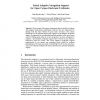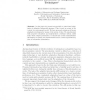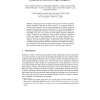AH
2004
Springer
15 years 6 months ago
2004
Springer
Current search engines rely on centralized page ranking algorithms which compute page rank values as single (global) values for each Web page. Recent work on topic-sensitive PageRa...
88
Voted
AH
2004
Springer
15 years 6 months ago
2004
Springer
Closed corpus AH systems demonstrate what is possible to achieve with adaptive hypermedia technologies; however they are impractical for dealing with the large volume of open corpu...
106
Voted
AH
2004
Springer
15 years 6 months ago
2004
Springer
Abstract. The PageRank algorithm demonstrates the significance of the computation of document ranking of general importance or authority in Web information retrieval. However, doi...
AH
2004
Springer
15 years 6 months ago
2004
Springer
Abstract. The ability of an adaptive hypermedia system to create tailored environments depends mainly on the amount and accuracy of information stored in each user model. One of th...
AH
2004
Springer
15 years 6 months ago
2004
Springer
Abstract. In this paper we present an approach to time-based adaptation in adaptive hypermedia systems. Time is used as a part of the context (or environment) model. We have propos...
85
Voted
AH
2004
Springer
15 years 6 months ago
2004
Springer
This paper presents a comparison among several well-known machine learning techniques when they are used to carry out a one-session ahead prediction of page categories. We use reco...
139
Voted
AH
2004
Springer
2004
Springer
The Personal Reader: Personalizing and Enriching Learning Resources Using Semantic Web Technologies.
15 years 6 months ago
Traditional adaptive hypermedia systems have focused on providing adaptation functionality on a closed corpus, while Web search interfaces have delivered non-personalized informati...
97
Voted
AH
2004
Springer
15 years 6 months ago
2004
Springer
Developing adaptive, rich-media, eLearning courses tends to be a complex, highly-expensive and time-consuming task. A typical adaptive eLearning course will involve a multi-skilled...
80
Voted
AH
2004
Springer
15 years 6 months ago
2004
Springer
102
Voted
AH
2004
Springer
15 years 6 months ago
2004
Springer
We describe a P2P system that offers a distributed, cooperative and adaptive environment for bookmark sharing. DAD offers an adaptive environment since it provides suggestions abou...



